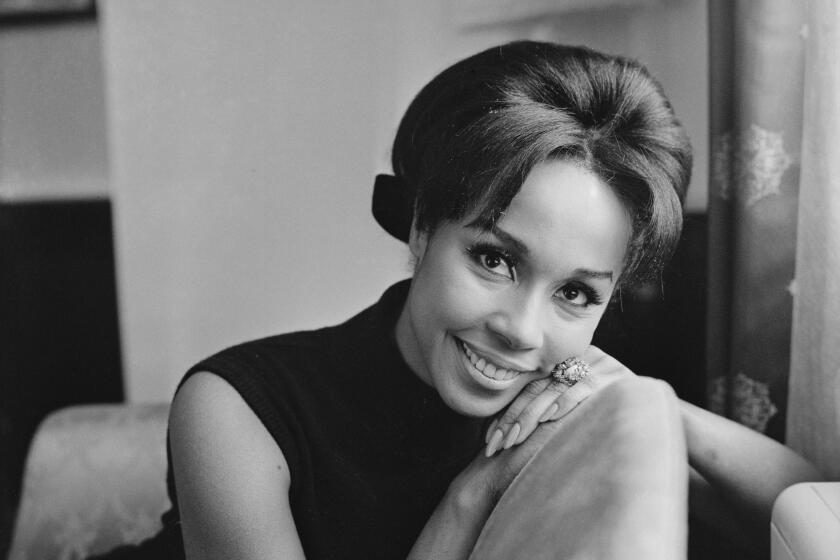Diahann Carroll, groundbreaking star of TV’s ‘Julia’ and ‘Dynasty,’ dies at 84

- Share via
Diahann Carroll, the elegant star of stage and screen who changed the course of television history as the first African American woman to be cast as a professional rather than a domestic worker in 1968’s groundbreaking sitcom “Julia,” and to win a lead actress Tony Award, has died. She was 84.
The Oscar-nominated actress and breast cancer survivor, who also starred in “Dynasty” and “White Collar,” died of cancer, her daughter Suzanne Kay said Friday.
Carroll burst on the scene as one of the first black actresses to star in studio films. Assisted by her breathy, deep voice, the established recording artist debuted on the big screen in 1954’s Oscar-nominated adaptation of “Carmen Jones,” a retelling of the Bizet opera with an all-black cast alongside Dorothy Dandridge, Harry Belafonte and Pearl Bailey. In 1959, she headlined the musical “Porgy and Bess” with Dandridge, Sidney Poitier and Sammy Davis Jr.
The dynamic entertainer, whose TV credits included “A Different World” and “Grey’s Anatomy,” sang in nightclub and on the Broadway stage, headlined in Las Vegas with her fourth husband, Vic Damone, and notched Emmy, Grammy and Golden Globe nominations. Carroll was nominated for a lead actress Oscar for her turn as a welfare mom in the 1974 comedy “Claudine” and earned a Tony Award in 1962 for Richard Rodgers’ “No Strings.”
Tributes to the late actress Diahann Carroll poured in Friday from Oprah Winfrey, Ava DuVernay, Viola Davis and others in and around Hollywood.
In the late 1960s, Carroll was cast in “Julia,” the enormously successful NBC sitcom that featured her as a war-widowed nurse raising a son. The pioneering role was a departure from her black predecessors who typically played domestic workers and was credited with shattering stereotypes ahead of “The Cosby Show,” which didn’t premiere until 1984.
“That experience for television,” she said in a 2011 interview with the Archive of American Television, “everyone was on the line and everyone was scared because we were saying to the country, ‘We’re going to present a very upper-middle-class black woman raising her child and her major concentration will not be about suffering in the ghetto. We don’t know if you’re going to buy it but this is what we’re going to do. Take a different point of view of blacks in the United States.’”
In the Aaron Spelling hit series “Dynasty,” Carroll embodied another atypical black woman on television: the deliciously catty Dominique Deveraux, Blake Carrington’s long-lost, illegitimate half-sister, whom she emphatically dubbed the “first black bitch on prime-time television.”
Born Carol Diahann Johnson on July 17, 1935, in the Bronx, she moved to Harlem with her parents at a young age. With their support she enrolled in dance, singing and modeling classes and attended the High School of Music & Arts with Billy Dee Williams, who would later costar with her in “Dynasty,” “Lonesome Dove: The Series” and the widely panned “Star Wars Christmas Special.” By 15, the leggy teen was modeling for Ebony, and by 18 she got her big singing break after winning the televised talent show “Chance of a Lifetime” in 1954. She received a cash prize in addition to being booked at the famed Latin Quarter nightclub in New York City.
Later that year, she hit the big screen as a bit player in Otto Preminger’s adaptation of “Carmen Jones” and made her Broadway debut in “House of Flowers.”
“I loved every moment of it,” she told The Times of her early break. “I just assumed everyone’s career went through the same machinations. It wasn’t until much later that I realized how fortunate I had been.”
While working on “House of Flowers,” Carroll fell for casting director Monte Kay, with whom she had daughter Suzanne. She was only a teenager and they “had a lot of growing up to do,” she said, but she was grateful for the union because it produced her daughter Suzanne Kay.
It only took a few days into working on 1959’s “Porgy and Bess” for Poitier to take notice of his beautiful costar, whose nine-year love affair with him would result in the demise of his first marriage.
Carroll, a self-described “terrible romantic, just ridiculously so,” continued to make headlines with her love life.
She was married briefly to a Las Vegas businessman but dismissed that episode as “a silly marriage and a silly divorce.” She was briefly engaged to English journalist David Frost, but they never married. Her third husband, Robert A. DeLeon, was much younger , but she said he was “a complex, brilliant young man.” Together, the two launched their SuMo production company, which yielded her well-received CBS variety series, “The Diahann Carroll Show,” in 1976. DeLeon died a year later.
Carroll moved to Los Angeles with her daughter for “Julia” and garnered a Golden Globe for female TV star and a nomination for best TV show, among other nods. She was also nominated for a lead actress in a comedy Emmy in 1969. Because the show was sponsored by toy maker Mattel, she served as the model for one of the first black Barbie dolls and found her likeness plastered on a variety of merchandise, including lunchboxes and coloring books.
“Julia” aired amid the Vietnam War protests, the assassinations of Dr. Martin Luther King Jr. and Robert F. Kennedy Jr. and thunderous civil rights marches across the country. It was criticized for being trite, unrealistic and a far cry from the bitter realities plaguing African Americans.
Among the grievances: There was no black male or father figure for Julia’s son to relate to. She and her costars were even scrutinized for wearing fancy clothes and living in an unaffordable apartment on the show. Carroll often found herself having to defend the show, though she usually directed it to the creative powers, and was hospitalized twice because of stress. After three seasons, Carroll declined to renew her contract.
“You must stop believing that the only thing that is valid for blacks on television is a documentary. We’re doing a comedy. Let us do a comedy. Slowly it permeated, the range of everything ... single women’s issues began to be addressed,” she said. “We were of the opinion that what we were doing was important and we never left that point of view. Even though some of the criticism was valid, that was not what we were doing.”
She took a grittier turn in the titular role of 1974’s “Claudine,” which earned Carroll her only Oscar nomination as a mother struggling to raise her six children on welfare who falls for a garbage collector, played by James Earl Jones.
She followed up that performance by filling in for Elizabeth Ashley in the well-received 1983 play “Agnes of God,” portraying a psychiatrist.
Then came the smash hit “Dynasty,” which she appeared on from 1984 until 1987. She left before the show went off the air in 1989 and landed a guest stint on Cosby’s NBC sitcom “A Different World,” for which she earned an Emmy nomination.
She racked up more TV credits in the early 2000s, appearing in “Whoopi,” “Grey’s Anatomy” and “Diary of a Single Mom” before landing a recurring role on USA’s “White Collar” as a wealthy widow. The actress declined to partake in the 2006 “Dynasty” reunion because she was “appalled” by the monetary compensation.
Carroll didn’t even watch the special, which ended up with pretty abysmal ratings despite the popularity of the original show, which starred Joan Collins and John Forsythe.
“There’s such a thing as accepting the fact that something has had its day. Let it go with dignity. ‘Dynasty’ was a romp in the first place. If we can’t add to the fun and the quality of the romp, leave it alone.”
Late in life, Carroll suffered throat issues that forced her to stop singing.
In 2013, she was tapped to return to Broadway opposite Denzel Washington in Lorraine Hansberry’s “A Raisin in the Sun,” but she dropped out of the production during rehearsals. That same year, she revived her comedic chops, starring in Craig Robinson’s “Peeples” with Kerry Washington, playing well-to-do matriarch Nana Peeples.
In addition to her daughter, who is a journalist and producer, Carroll is survived by two grandchildren.
More to Read
Start your day right
Sign up for Essential California for the L.A. Times biggest news, features and recommendations in your inbox six days a week.
You may occasionally receive promotional content from the Los Angeles Times.








